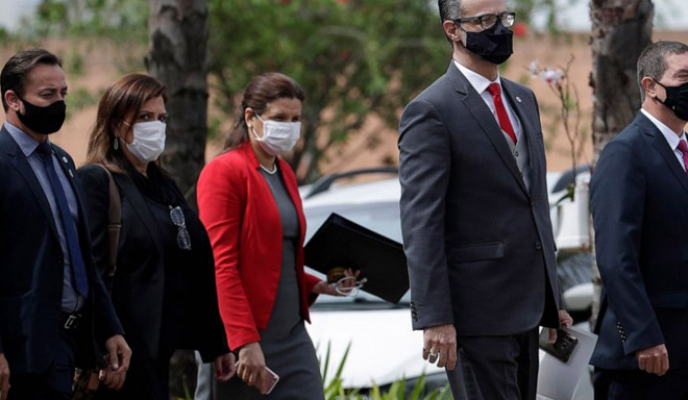

RIO DE JANEIRO — Brazil’s health regulator on Sunday approved the urgent use of coronavirus vaccines made by Sinovac and AstraZeneca, enabling Latin America’s largest nation to begin an immunization program that’s been subject to delay and political disputes.
Brazil currently has 6 million doses of Sinovac’s CoronaVac vaccine ready to distribute in the next few days and is awaiting the arrival of 2 million doses of the vaccine made by AstraZeneca and partner Oxford University.
“This is good news for Brazil, but 6 million doses are still very few. It will not allow the entire population at risk to be fully immunized, nor is it clear how quickly the country will obtain more vaccines,” said Ethel Maciel, an epidemiologist at the Federal University of Espirito Santo.
On Saturday night, the health regulator Anvisa rejected an application for use of a Russian vaccine called Sputnik V, submitted by Brazilian company União Química. Anvisa said it didn’t evaluate the application because it didn’t meet minimum requirements to start an analysis.
Vaccination in Brazil is beginning later than neighbors such as Argentina and Chile despite a robust public health system and decades of experience with immunization campaigns. The process to present and approve the COVID-19 vaccines was fraught with conflict, as allies of President Jair Bolsonaro sought to cast doubt on the efficacy of the Sinovac shot backed by his political rival, Sao Paulo state’s Gov. João Doria.
“The rivalry between Brasilia and the state governments prevented any cooperative work,” said Maurício Santoro, professor of political science at the University of the State of Rio de Janeiro. “The governor lost the leadership position, but made Bolsonaro act more quickly to guarantee the start of vaccination.”
The vaccination priority will be health professionals on the front line against coronavirus. Vaccination by the federal government will begin on Wednesday, Health Minister Eduardo Pazuello said on Sunday.
Sao Paulo state started immunization Sunday after Anvisa’s decision. Mônica Calazans, a 54-year-old nurse who works on the coronavirus front line, was vaccinated in a ceremony led by Doria. Calazans had participated in the CoronaVac clinical trial. As more doses are available, immunization will be extended to others including the Indigenous population, people over 60 years of age and people with pre-existing diseases, according to the vaccination plan presented by the federal government.
The Brazilian government is considering extending the time between the application of first and second doses of immunizers to reach more people quickly, Health Minister Eduardo Pazuello said in Manaus on Monday.
The Amazonian city of Manaus, the first state capital whose health system collapsed in 2020 due to the pandemic, is once again experiencing a critical situation, with a lack of oxygen in some hospitals. Doctors in the Amazon rainforest’s biggest city are having to choose which COVID-19 patients can breathe amid dwindling oxygen stocks.
Hospitals in Manaus, an isolated city of 2.2 million people, have admitted few new COVID-19 patients, causing many to suffer from the disease at home and some to die. Other Brazilian states have offered to receive patients and decongest Manaus’ health system.
Bolsonaro, who contracted COVID-19 and said in the past that he does not plan to be vaccinated, has raised suspicions about the effectiveness of the Chinese vaccine, which will be produced locally by an institute that depends on the Sao Paulo government. Gov. Doria has criticized Bolsonaro’s handling of the pandemic.
The Sao Paulo government had generated mistrust with a confusing announcement about the results of the CoronaVac vaccine. Doria announced on Jan. 7 that the efficacy of the immunizer was 78% for mild patients and 100% for severe cases. One week later, in a press conference in which the governor was absent, officials from his government said the clinical efficacy of CoronaVac was only about 50%.
Some scientists warn that not enough data has been published about the effectiveness or safety of Sinovac’s vaccine. It has yet to be tested in tens of thousands of people in the kind of rigorous study considered necessary before being licensed for wide use.
Global health authorities have said any vaccine that is at least 50